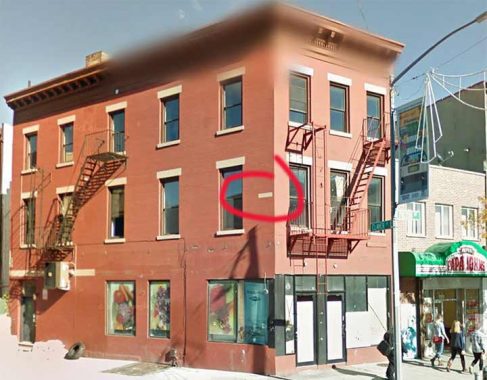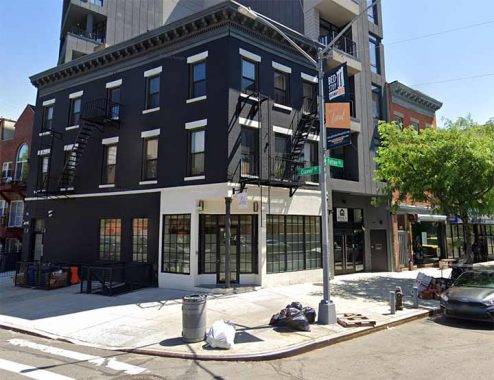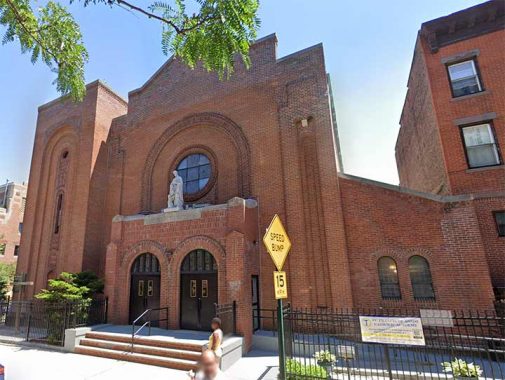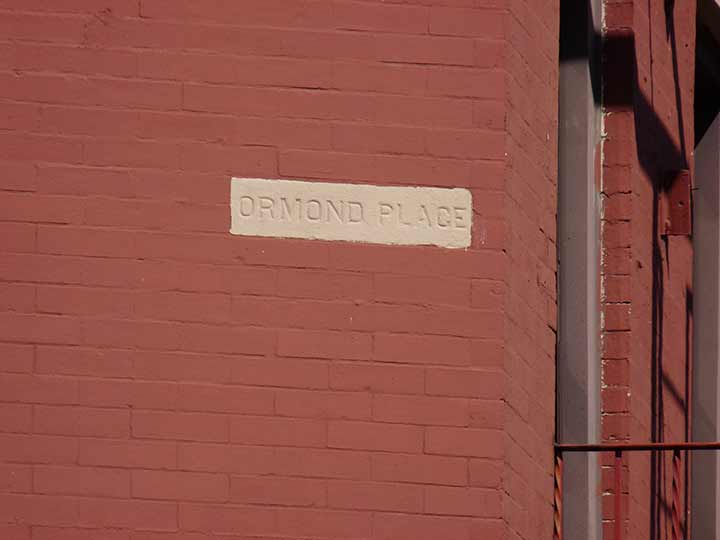
On the very same foray in the spring of 2016 in Prospect Heights and Bedford-Stuyvesant in which I snapped the old Improved Benevolent and Protective Order of the Elks of the World building before it was torn down, I found a former Brooklyn street name that has now had all trace destroyed. I had my eagle eye working that day it seems.

I smell another Forgotten NY series coming. On the (so far) undefended border of Crown Heights and Bedford Stuyvesant, there’s a plethora of short, one or two-block “Places” between Fulton and Herkimer Streets and Atlantic Avenue. One of them is Claver Place. However, when I found this brick corner building at Claver and Fulton (captured here on Street View in 2016), I found a chiseled sign that didn’t have Claver Place, but Ormond Place instead. Thus, at some time in the past, Ormond became Claver.

By the following year the building had gotten a complete makeover, as gone were the red bricks to be replaced by gun metal gray ones. Happily, the original cornice was permitted to remain as it was. Unhappily, though, a tall gray monstrosity has wrapped itself around the corner building and the Ormond Place sign has been obscured and is now difficult to make out.

Ormond was renamed Claver Place at some time in the past (I haven’t time to research when, but a 1949 Hagstrom I have access to has it as Claver.) It was renamed for St. Peter Claver Church up the block, which was founded in 1921 as the first Black Roman Catholic parish in the diocese of Brooklyn. However the church building is apparently older than that, as it formerly hosted Congregational, Episcopalian, and Baptist congregations.
Peter Claver (1580-1654) was a Spanish Jesuit priest and missionary who worked to assuage the suffering of enslaved people in the New World. He was canonized in 1888 by Pope Leo XIII, who declared Claver the patron of missionary work among all African people.
As always, “comment…as you see fit.” I earn a small payment when you click on any ad on the site. Take a look at the new JOBS link in the red toolbar at the top of the page on the desktop version, as I also get a small payment when you view a job via that link.
12/20/23


7 comments
Here is a link to a 1940 photo of the same building at Claver and Fulton.
https://1940s.nyc/map/photo/nynyma_rec0040_3_01997_0061#17.5/40.682238/-73.956206
It’s hard to see, but the marker is, indeed, still on the building. I can still see it on the latest available Google Street View (June 2022) and previous iterations. Seems that didn’t replace the bricks, but just painted them over.
In the first photo, it appears that the building has been painted over the bricks. I suspect that only the bricks on the first floor were changed to allow for the new entrance. The windows, lintels and sills appear the same, as do the fire escapes. It is possible that, to cover the different bricks and to create a unified and “fresh” look, the building was painted after the changes were made. Therefore, it is possible that the “Ormond Place” marker is still there, but has been painted over.
Going by Google Street View, the Ormond Place sign was actually not blasted into oblivion, but it was covered in a thick coat of the gun metal gray paint. It’s hard to see, but it’s there.
On earlier maps of the area (1839 – 1851) it is shown as Fleet Street. By 1855 it had become Ormond Street, likely to avoid duplication with another Fleet Street located Downtown. It appears that Ormond Street and Ormond place were used interchangeably for a while, as both designations are used in the Eagle. The change to Claver Place seems to have occurred about 1930.
Well, you better “git “er done” soon because the end is near:
https://nypost.com/2023/12/20/opinion/politicians-are-turning-new-york-into-the-big-crapple/
The Brooklyn Daily Eagle, March 24, 1931 edition, page 17, an article about St. Peter Claver Church mentions “Claver Place (formerly Ormond Place).”
Merry Christmas, NYCREFUGEEINNJ. Did my screen name inspire yours? “Imitation is the sincerest form of flattery”